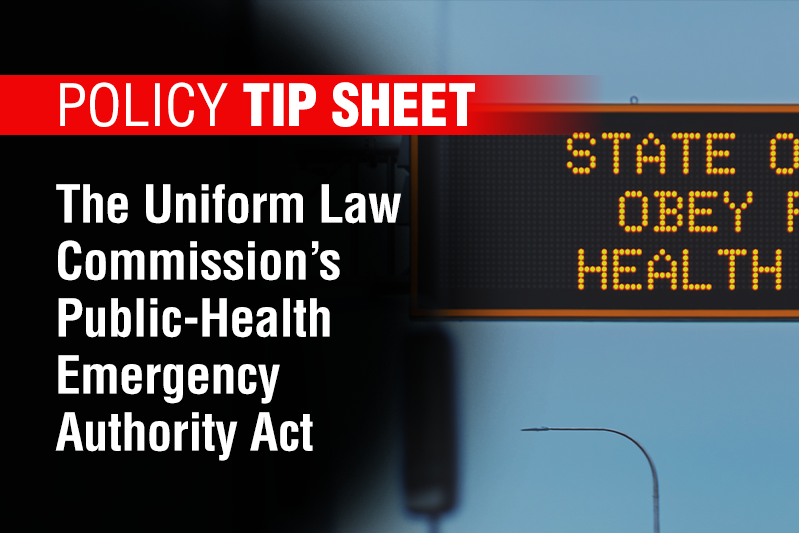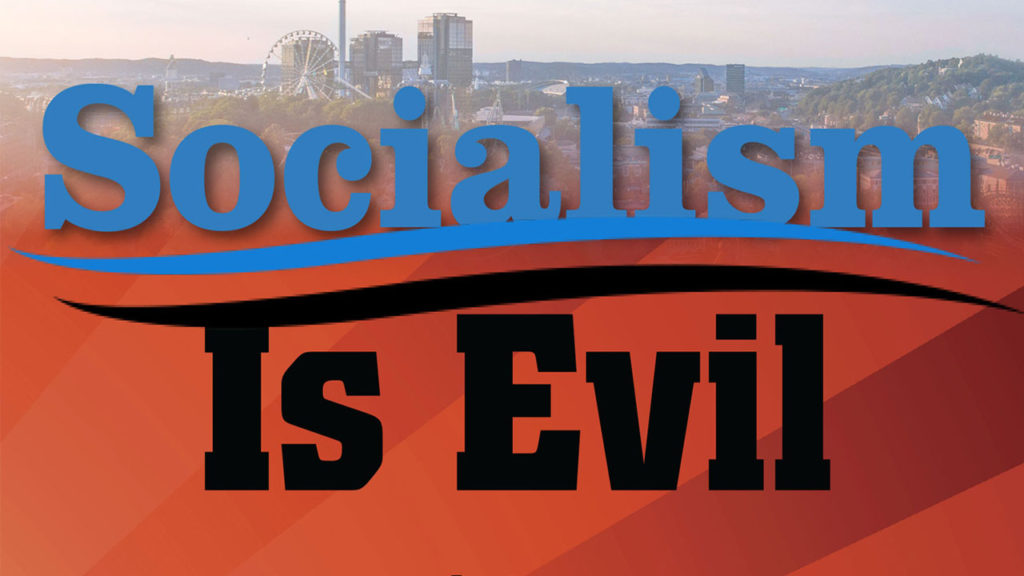(Click here to read the full Policy Tip Sheet in PDF form.)
The American public continues to grapple with the fallout from the draconian measures implemented by federal, state, and local governments during the COVID-19 pandemic, which were often issued by unilateral executive fiat. The accuracy and source of public health information used as justification for these measures is still a subject of intense debate. Though the true cost of these repressive policies may never be fully calculated, they clearly inflicted immense damage upon the U.S. economy, democratic institutions, individual rights, and general societal health.
Despite these significant harms, the Uniform Law Commission (ULC) has drafted a model bill—the Public-Health Emergency Authority Act (PHEAA)— that would both formally institutionalize the executive emergency powers wielded by state governors during the pandemic while also significantly strengthening them. At its July 2023 annual meeting, the ULC formally approved the PHEAA for distribution to all state legislatures.1
Before delving into the details surrounding the PHEAA, it is important to first provide background context about the organization responsible for its creation. The ULC—also known as the National Conference of Commissioners on Uniform State Laws—was created more than 130 years ago with the purpose of drafting legislation designed to be uniformly adopted by all 50 states. According to its website, the ULC “provides states with non-partisan, well-conceived and well-drafted legislation that brings clarity and stability to critical areas of state statutory law.”2
The ULC consistently presents itself as a non partisan organization that exists only to provide expert legal advice and serve the interests of the public. However, recent research indicates that the ULC has served special interests—such as the world’s most powerful financial institutions—for decades, to the extreme detriment of the public. For instance, through amendments to the Uniform Commercial Code in the 1990s, the ULC revoked all property rights to investment securities and placed them in the hands of too-big-to-fail banks.3 Currently, the ULC and banking lobbyists are trying to convince states to adopt new amendments to the UCC, which would facilitate a totalitarian central bank digital currency controllable by banks, the federal government, and/or other powerful institutions.4 Further, these same 2022 UCC amendments would also strip Americans of their property rights to tangible assets, all to the benefit of the same monolithic financial institutions and their allies.5
Considering the ULC’s established degradations of individual rights and societal welfare, policymakers should tread carefully when considering anything the ULC promotes. This is especially true of the PHEAA.
THE PUBLIC-HEALTH EMERGENCY AUTHORITY ACT
The Uniform Law Commission produced the Public Health Emergency Authority Act to normalize COVID-19 emergency measures and give governors even more executive authority and latitude than they enjoyed during the pandemic, while entirely removing state legislatures from the policymaking process. According to the ULC’s prefatory note to the PHEAA, current legislative statutes related to public health emergencies do not afford governors enough power; the ULC contends that these statutes “did not address adequately or at all many of the actions that became necessary during the COVID-19 pandemic.”6 In response to this perceived deficiency in public health-related disaster preparedness, the ULC drafted the PHEAA to “…improve the preparedness of states for public-health emergencies”7 by “[clarifying] the powers of a Governor to declare a public-health emergency and to issue orders in response to that emergency.”8
The ULC explains that the revision of current statutes—including recently passed state legislation designed to curb the type of executive overreach endemic throughout the COVID-19 outbreak—is necessary to protect citizens from future public health emergencies. The PHEAA’s prefatory note directly states that “legal uncertainties contributed to the decision of many individuals, businesses, and some legislatures to file lawsuits challenging the statutory and constitutional authority of Governors and other executive officials to respond to the risks posed by the pandemic,” which has resulted in “state legislation clawing back core public-health emergency powers from Governors and executive-branch officials… and the legal precedents and legislative examples from those states undermine the legal and political reliability of public-health emergency powers in all states.”9
Essentially, the PHEAA would allow governors and other public-health officials to create and enforce policy in a completely unfettered manner upon declaration of a public-health emergency. The PHEAA vaguely describes a public-health emergency as “an imminent threat or actual appearance of an infectious, biologic, radiologic, or chemical agent or toxin, regardless of cause, that poses a high probability of: (A) a large number of deaths of individuals in the affected population; (B) a large number of serious or long-term disabilities of individuals in the affected population; (C) widespread exposure to the agent or toxin that poses a significant risk of substantial harm to a large number of individuals in the affected population; (D) substantial adverse impact on the availability of medical, public health, or other emergency resources.”10
Concerningly, the PHEAA allows governors to declare public-health emergencies even if there is scant evidence such an emergency truly exists. The PHEAA states, “For example, there may be little information about the nature and risks of a novel virus that is spreading and harming all or part of a state’s population. In such a case, this section requires only that the Governor account for the little information that is then available when assessing whether a public health emergency exists and whether a declaration of a public-health emergency is warranted.”11
As for the powers afforded during a public-health emergency, the PHEAA outlines 17 categories that governors and/or delegated officials may impose, which include: “(4) testing, isolation, quarantine, movement, gathering, evacuation, or relocation of individuals… (7) surveillance, monitoring, or assessment of the public-health emergency or any of its effects… (8) suspension of a provision of any statute, order, rule, or regulation if strict compliance would hinder efforts to respond to the public-health emergency or pose undue hardship or risk… (9) access to and security of electronic communication in support of activities, including commerce, employment, education, notifications, and warnings,” and many other authoritarian measures.
Further, the PHEAA gives governors complete control over the renewal of public health emergency declarations. Though the initial declaration can only last 45 to 90 days, governors have the authority to renew them simply by providing notice to the legislature, which does not need to ratify the renewal. Don Grande, an attorney and a policy advisor for The Heartland Institute who has extensively studied the PHEAA and other ULC created policies, explains in a report analyzing the PHEAA that “the [drafting] committee considered whether to require the legislature to ratify a renewal of the declaration, but ultimately determined that this would unduly limit the governor’s authority.”12 Worse, there is no limit to how many times such an emergency declaration can be renewed; the PHEAA stipulates, “there is not a limit on the number of times the Governor may renew an initial or previously renewed declaration of a public-health emergency that has not expired.”13
RISKS ASSOCIATED WITH THE PHEAA
Planning for and responding to potentially dangerous diseases is a crucial responsibility of a nation’s people and their elected representatives, whether at the federal, state, or local level. However, the model espoused within the PHEAA is highly alarming and poses severe risks to individual liberties and institutional checks and balances, which severely threatens society.
For example, the vagueness of the PHEAA’s definition of a public-health emergency allows governors to abuse their power by declaring an emergency with little to no knowledge of the potential health risk, such as what often occurred during the early months of the COVID-19 pandemic. In his aforementioned report on the PHEAA, Grande writes, “The language within this model legislation pays little consideration to the fact that unilateral executive authority during the COVID-19 pandemic was often wielded based upon deeply flawed information and questionable sources.”14 Allowing governors to unilaterally renew public-health emergencies with no limitation would potentially force American citizens to live in a state of perpetual lockdown without possessing reliable information regarding the origin and/or lethality of the threat.
Just as governors are not required under the PHEAA to possess a strong premise for the original declaration of such emergencies or for their renewal, they are also not responsible for justifying the myriad measures that can be implemented to fundamentally alter society by restricting individual freedom. The PHEAA gives governors and designated officials a menu of authoritarian policies to choose from, including commandeering resources and physical property, quarantining individuals, restricting freedom of movement, surveilling citizens, and culling animal populations, among many more powers.15
Further, the PHEAA allows governors to impose such measures without input from the legislature, fundamentally destroying institutional checks and balances and the entire notion of separation of powers. Grande explains that “the true targets of the PHEAA are the handful of state legislatures that pushed back against the ‘consensus’ and challenged gubernatorial authority throughout the pandemic. True to its name, the ULC seeks uniformity: the inherent uniformity of executive authority without legislative interference.”16 Essentially, this model legislation endows governors with dictatorial power while simultaneously removing legislators from any meaningful policymaking procedures.
CONCLUSIONS
The Uniform Law Commission’s prefatory note to the PHEAA provides assurances that the goal of this model bill is to “empower a Governor to act quickly and decisively while also clarifying substantive and procedural limitations to a Governor’s authority.”17 These assurances are lip service, at best. The PHEAA provides no actual limitations to gubernatorial power; in fact, it allows governors and delegated officials to wield such power virtually unchecked.
While it is important to develop procedures designed to protect human life from the potential spread of deadly pathogens, placing all power to declare, renew, and manage public health emergencies in the hands of state governors sets an extremely dangerous precedent. To protect the rights and freedoms of the American people during such an emergency, state legislatures must be vested with the power to check executive authority and be involved in all major policy decisions that would affect the lives of their citizens. As mentioned, the PHEAA not only abrogates legislative authority, but is also expressly designed to mitigate legislative “interference.”
Ultimately, the passage of this model legislation would engender yet another massive trade of American’s already besieged fundamental freedoms for temporary safety and security. Legislators who value individual liberties—and who want to possess even a semblance of power to protect the rights of their constituents during any nebulously defined public health emergency scenario—should approach the PHEAA with extreme caution.
Endnotes
1 Katie Robinson, “ULC 2023 Annual Meeting Highlights,” Uniform Law Commission, August 2, 2023, https://www. uniformlaws.org/discussion/ulc-2023-annual-meeting-highlights
2 Uniform Law Commission, “About Us,” uniformlaws.org, accessed December 7, 2023, https://www.uniformlaws.org/ aboutulc/overview
3 For more information on how the ULC’s amendments to the UCC in the 1990s revoked property rights to investment securities, see: Jack McPherrin and Justin Haskins, “Revising Article 8 of the Uniform Commercial Code to Protect Americans’ Property Rights,” The Heartland Institute, March 12, 2024, https://heartland.org/publications/revising article-8-of-the-uniform-commercial-code-to-protect-americans-property-rights/
4 For more information on how the ULC’s 2022 amendments to the UCC facilitate a U.S. central bank digital currency, see: Jack McPherrin and Justin Haskins, “Central Bank Digital Currencies and the Uniform Commercial Code,” The Heartland Institute, December 1, 2023, https://heartland.org/publications/central-bank-digital-currencies-and-the uniform-commercial-code/
5 For more information on how the ULC’s 2022 amendments to the UCC could strip Americans of their property rights to tangible assets, see: Daylea Camp and Jack McPherrin, “The 2022 Amendments to the Uniform Commercial Code Abrogate Property Rights to Tangible Assets,” The Heartland Institute, Pro-Family Legislative Network, September 18, 2024, https://heartland.org/publications/the-2022-amendments-to-the-uniform-commercial-code-abrogate-property rights-to-tangible-assets/
6 The National Conference of Commissioners on Uniform State Laws, “Final Act, With Comments: Model Public-Health Emergency Authority Act,” uniformlaws.org, October 3, 2023, https://www.uniformlaws.org/committees/community home?communitykey=7a88c160-5910-4e41-9dff-018a850ef3b2
7 The National Conference of Commissioners on Uniform State Laws, “Final Act, With Comments: Model Public-Health Emergency Authority Act.”
8 The National Conference of Commissioners on Uniform State Laws, “Final Act, With Comments: Model Public-Health Emergency Authority Act.”
9 The National Conference of Commissioners on Uniform State Laws, “Final Act, With Comments: Model Public-Health Emergency Authority Act.”
10 The National Conference of Commissioners on Uniform State Laws, “Final Act, With Comments: Model Public-Health Emergency Authority Act.”
11 The National Conference of Commissioners on Uniform State Laws, “Final Act, With Comments: Model Public-Health Emergency Authority Act.”
12 Don Grande, “The Public-Health Emergency Authority Act: A Framework for Unchecked Gubernatorial Power,” Pro Family Legislative Network / The Heartland Institute, December 15, 2023, https://heartland.org/publications/the-public health-emergency-authorization-act-a-framework-for-unchecked-gubernatorial-power/
13 The National Conference of Commissioners on Uniform State Laws, “Final Act, With Comments: Model Public-Health Emergency Authority Act.”
14 Don Grande, “The Public-Health Emergency Authority Act: A Framework for Unchecked Gubernatorial Power.”
15 The National Conference of Commissioners on Uniform State Laws, “Final Act, With Comments: Model Public-Health Emergency Authority Act.”
16 Don Grande, “The Public-Health Emergency Authority Act: A Framework for Unchecked Gubernatorial Power.”
17 The National Conference of Commissioners on Uniform State Laws, “Final Act, With Comments: Model Public-Health Emergency Authority Act.”




